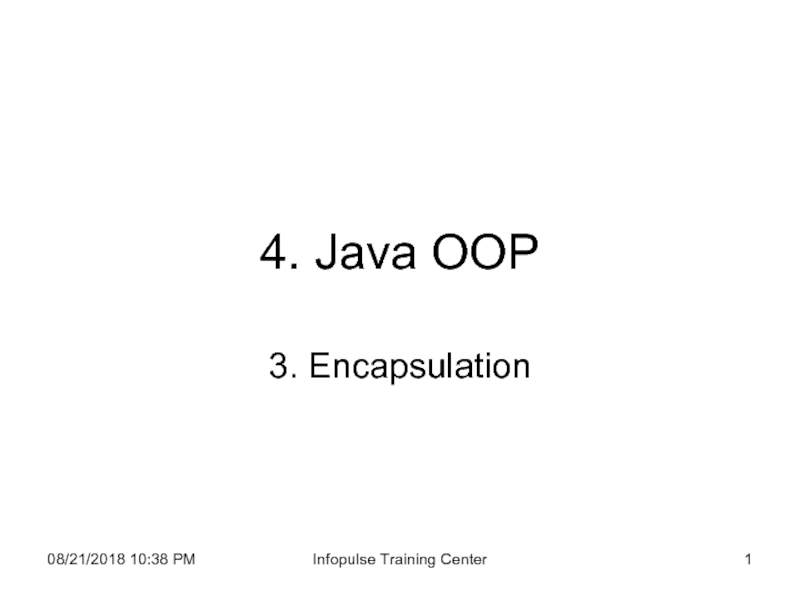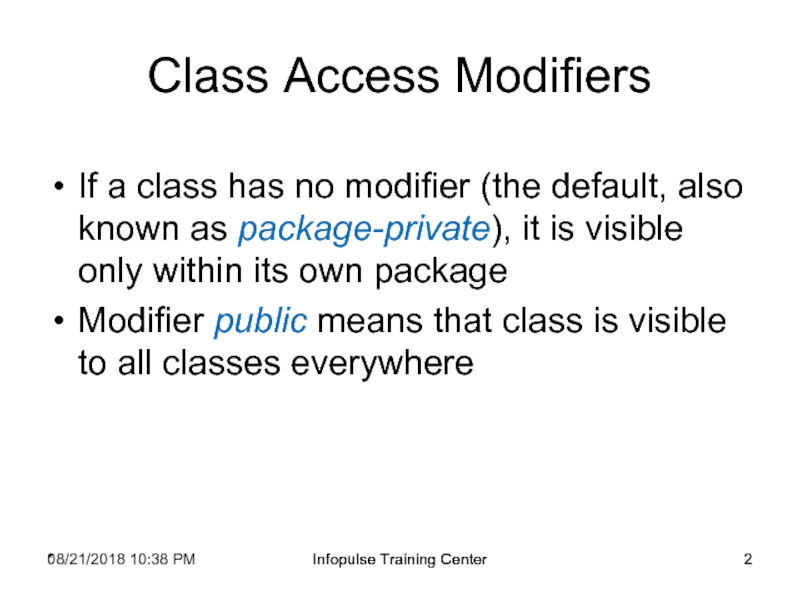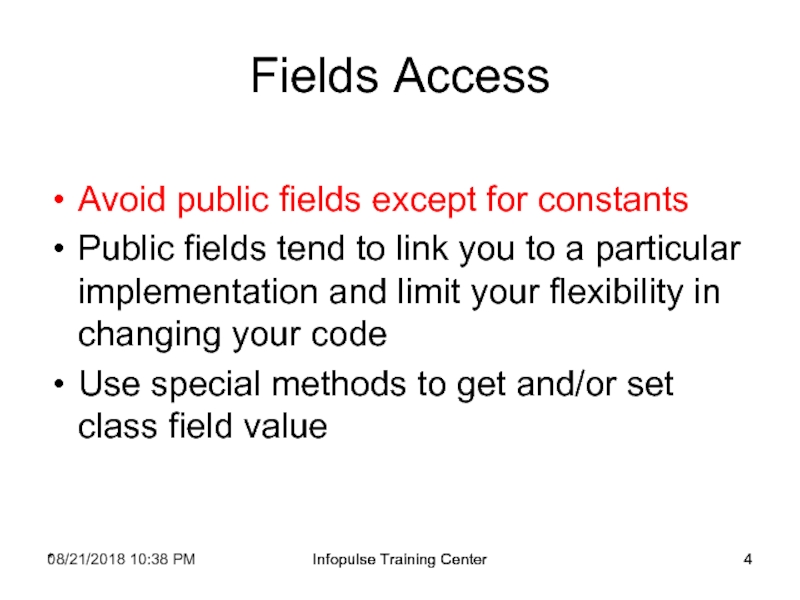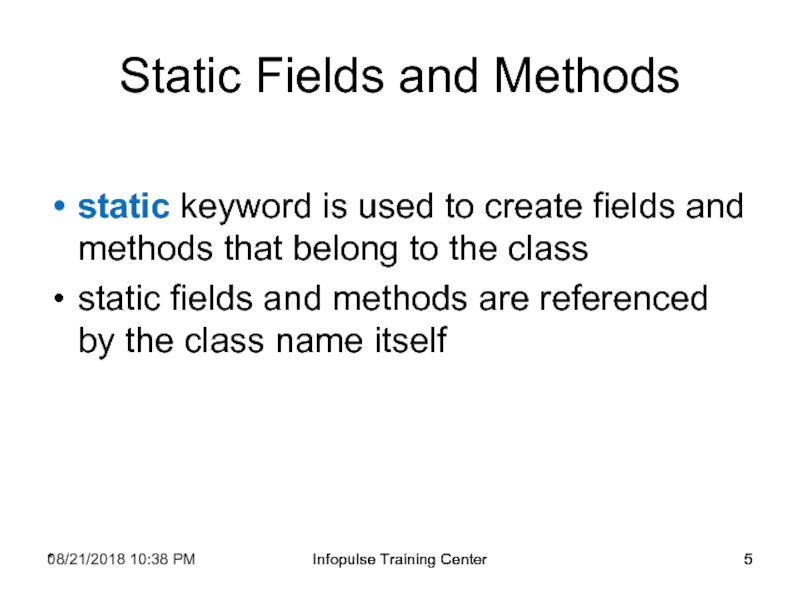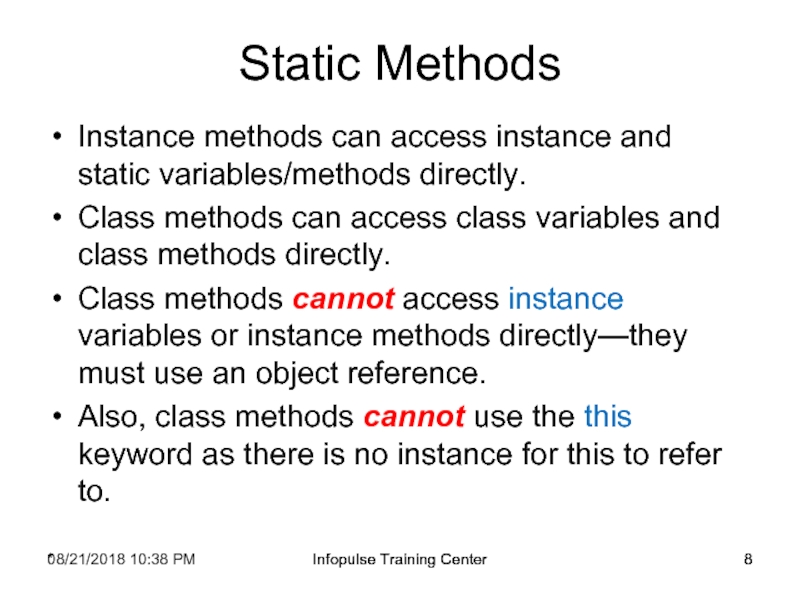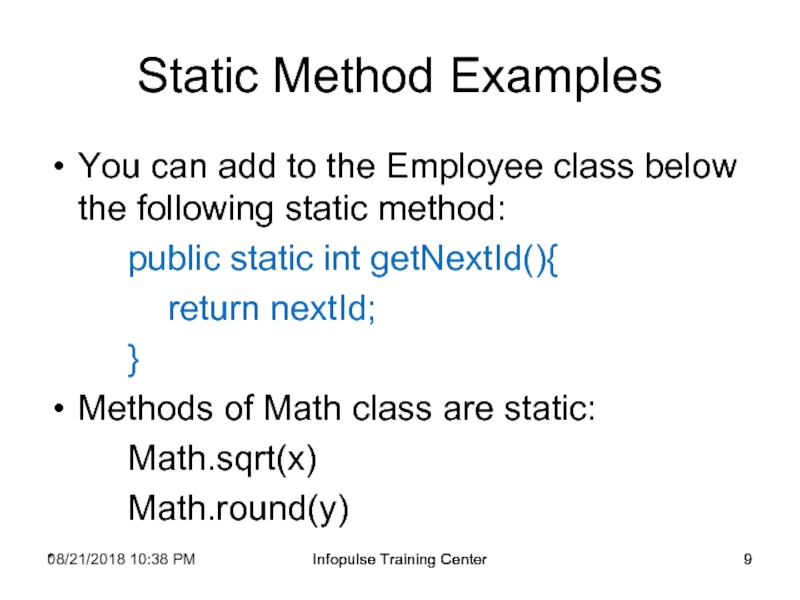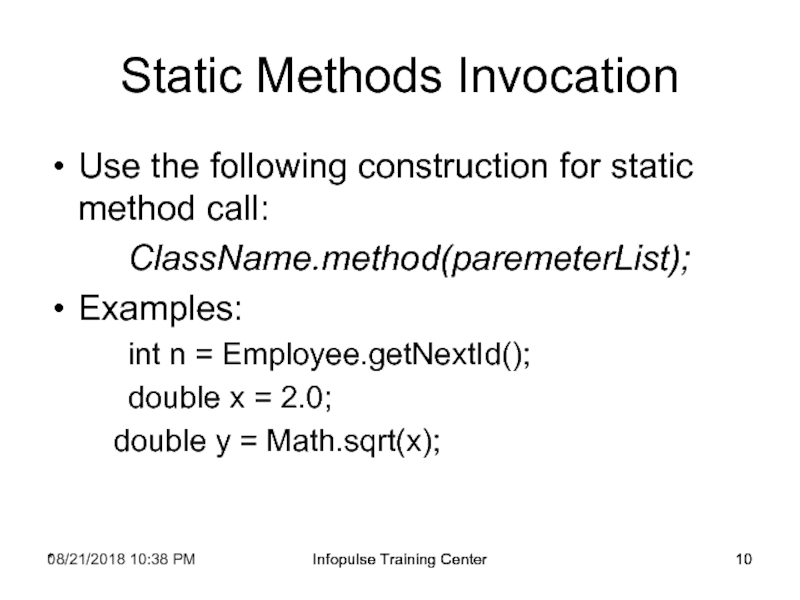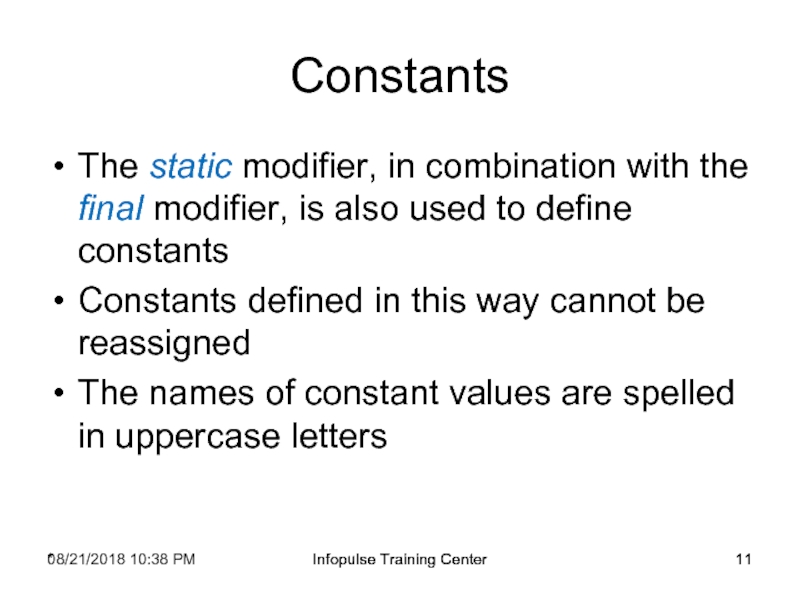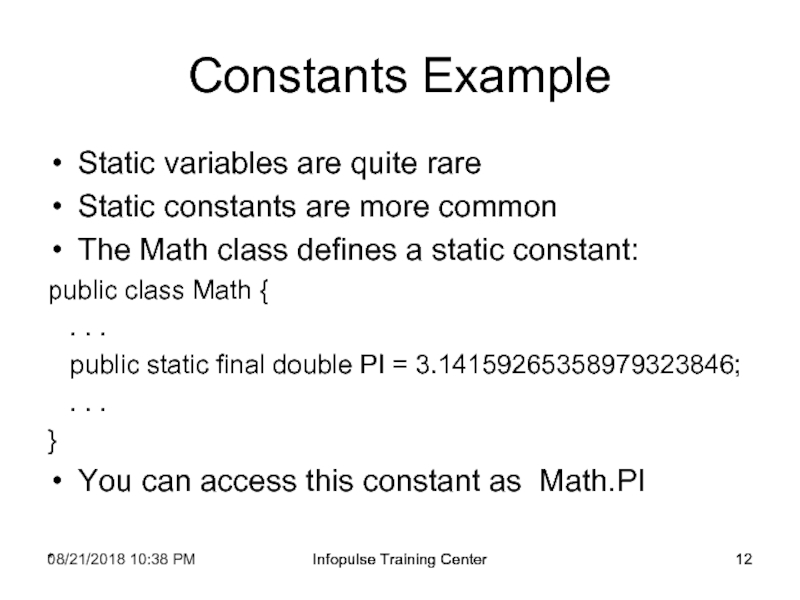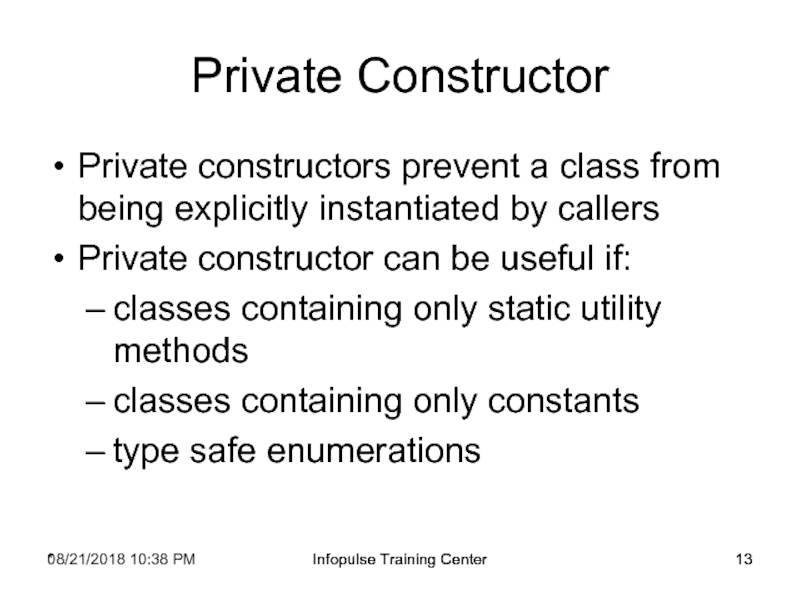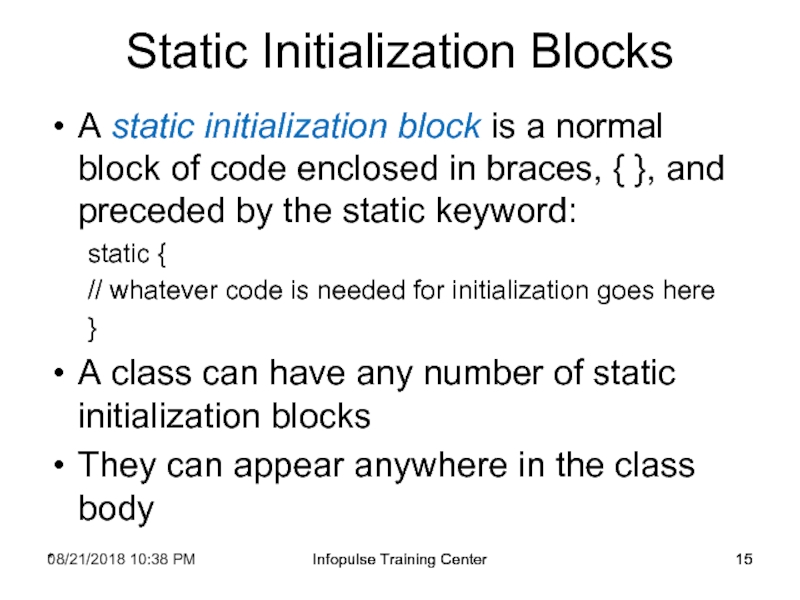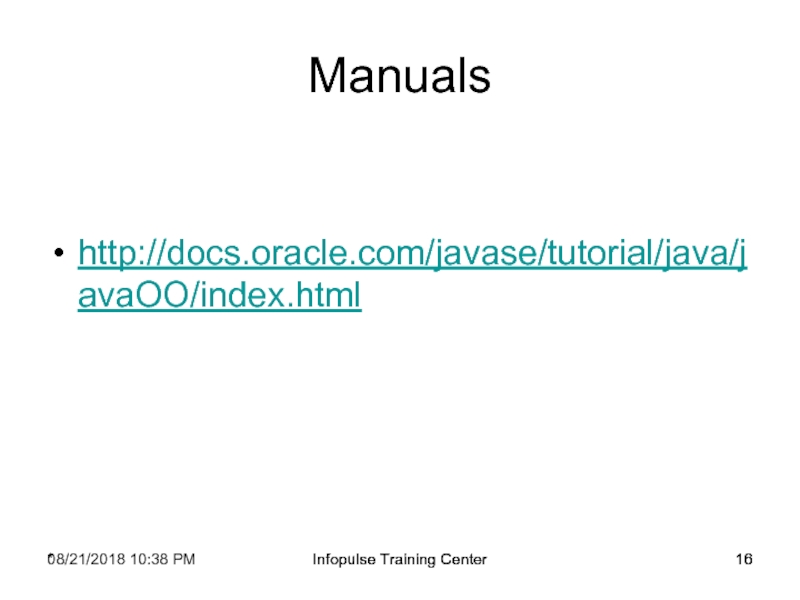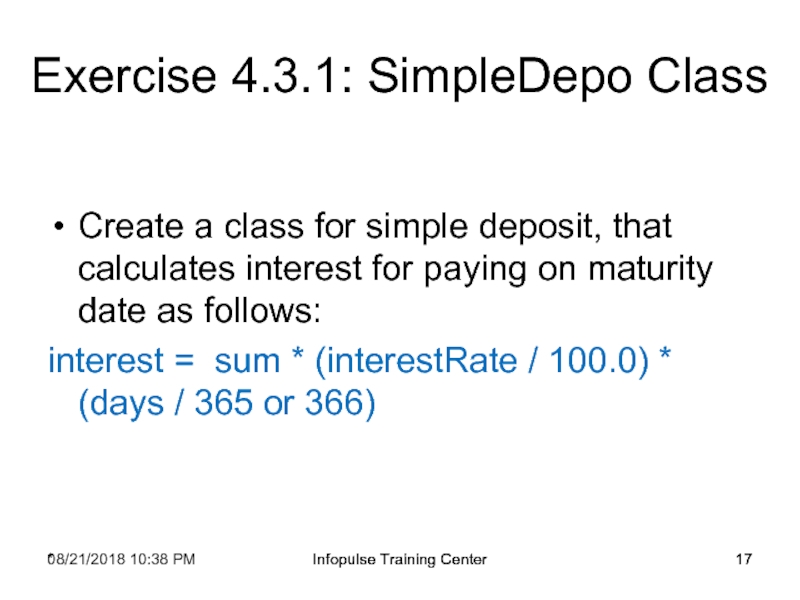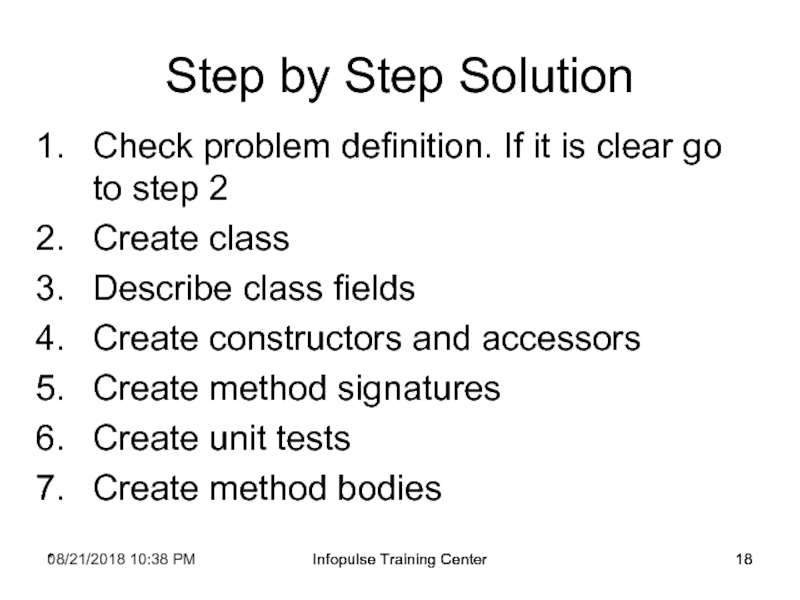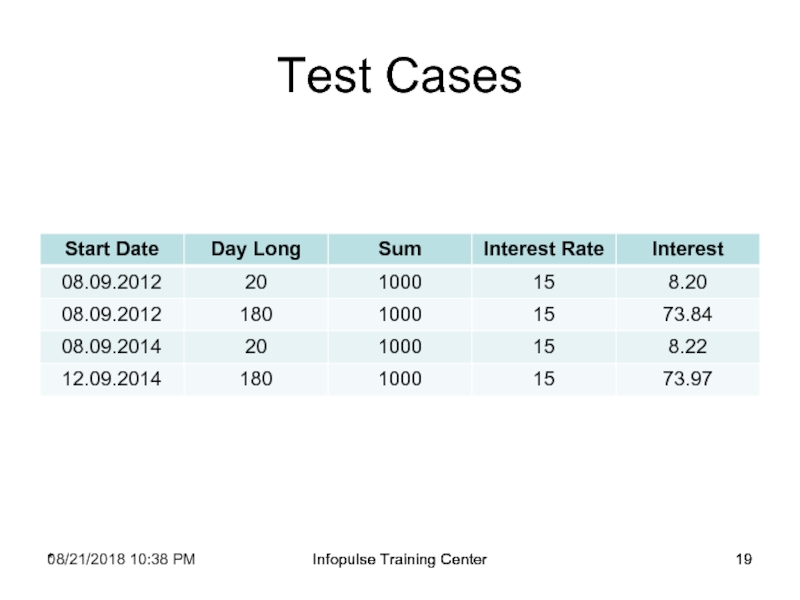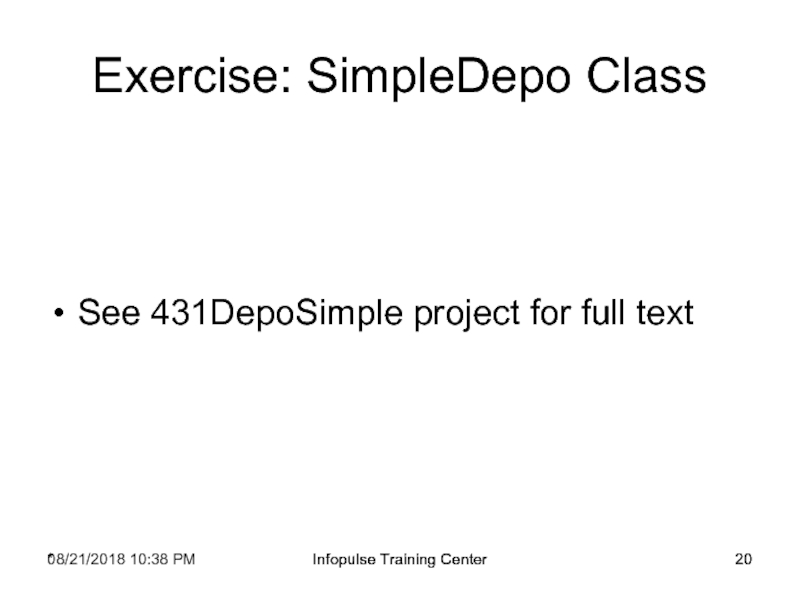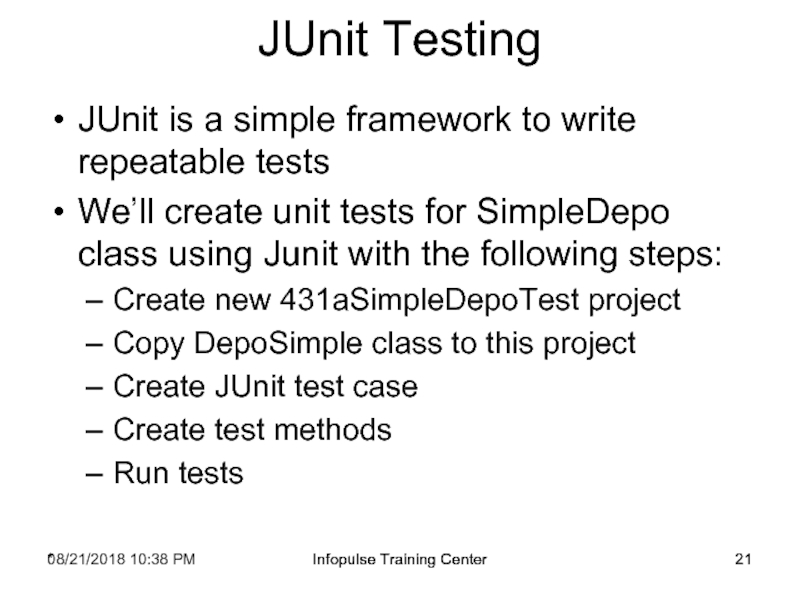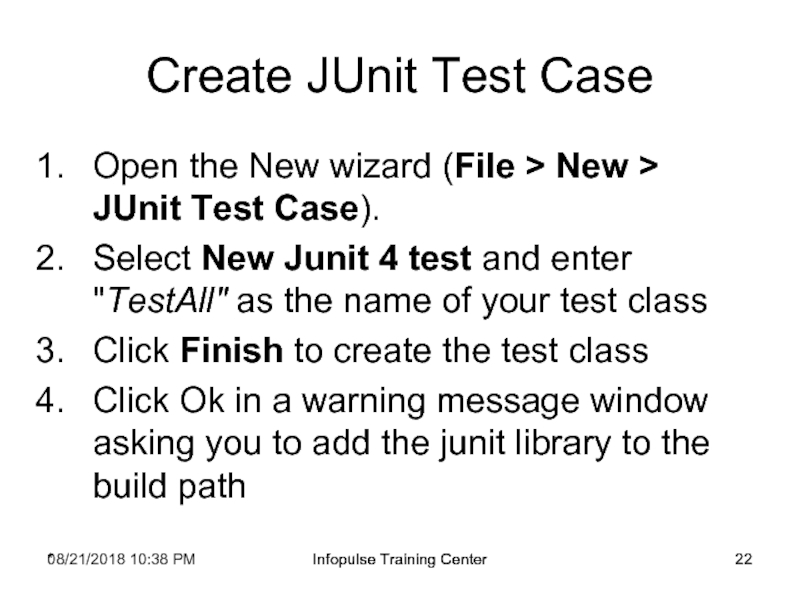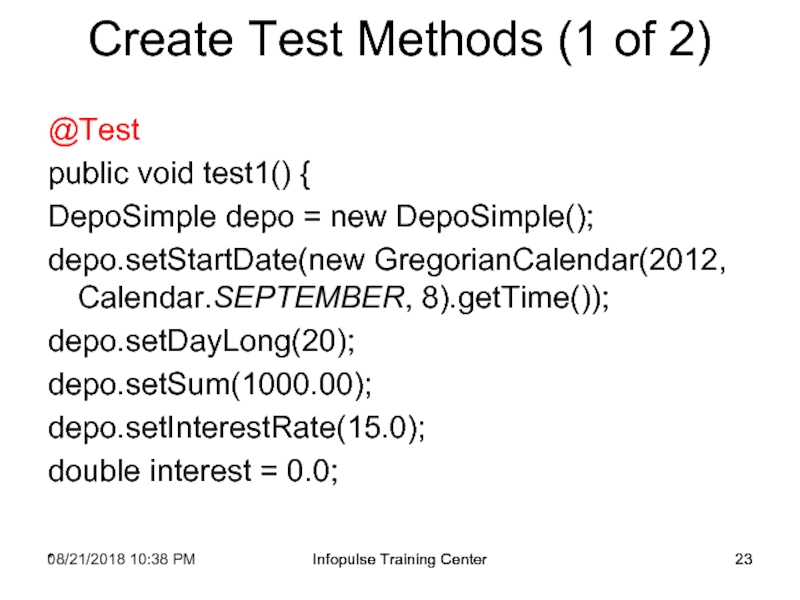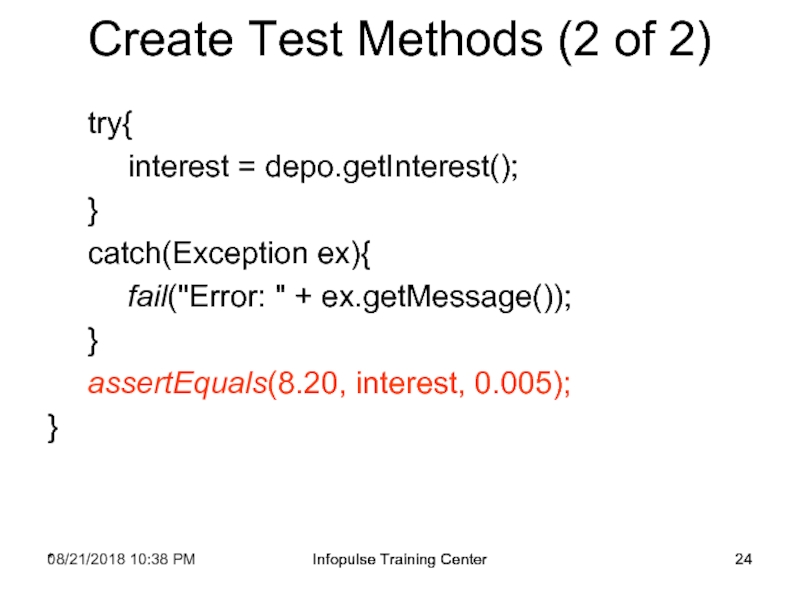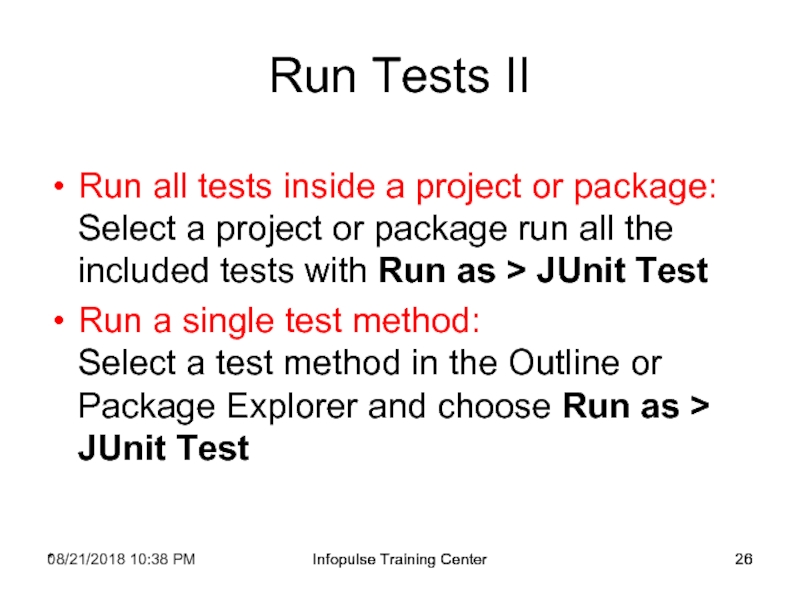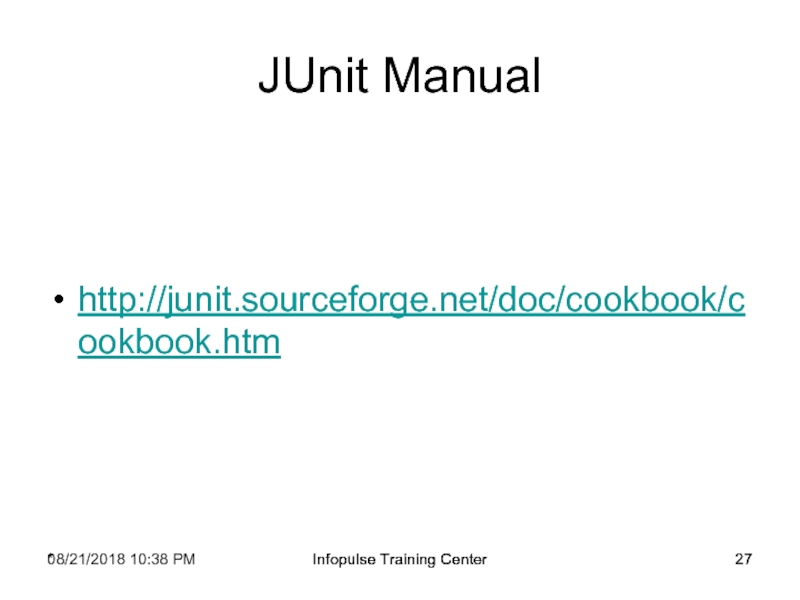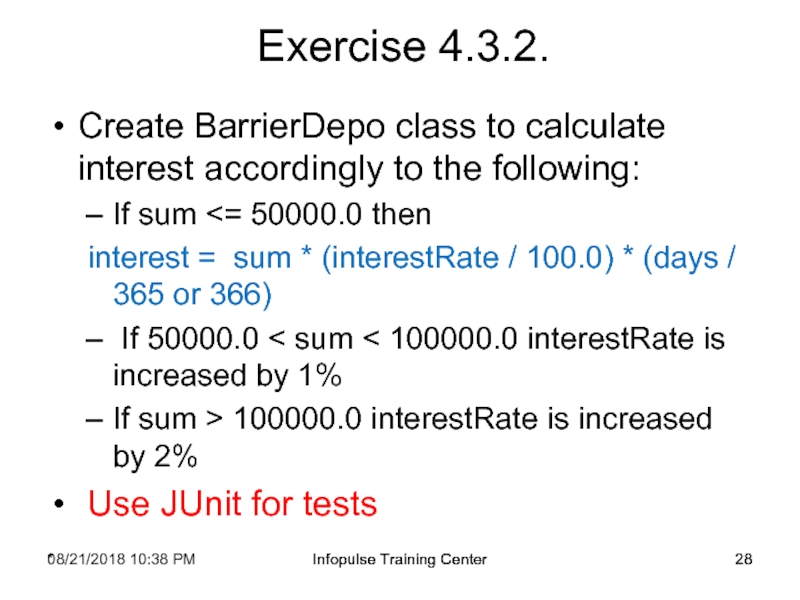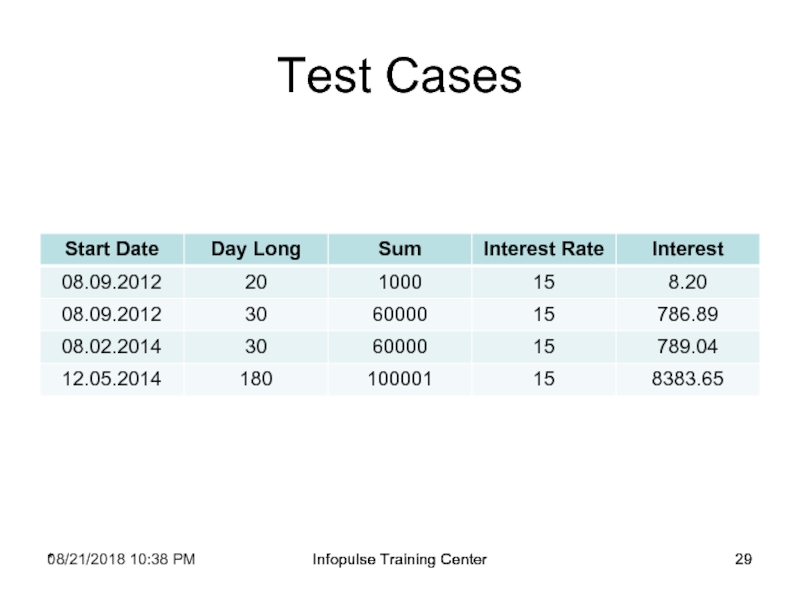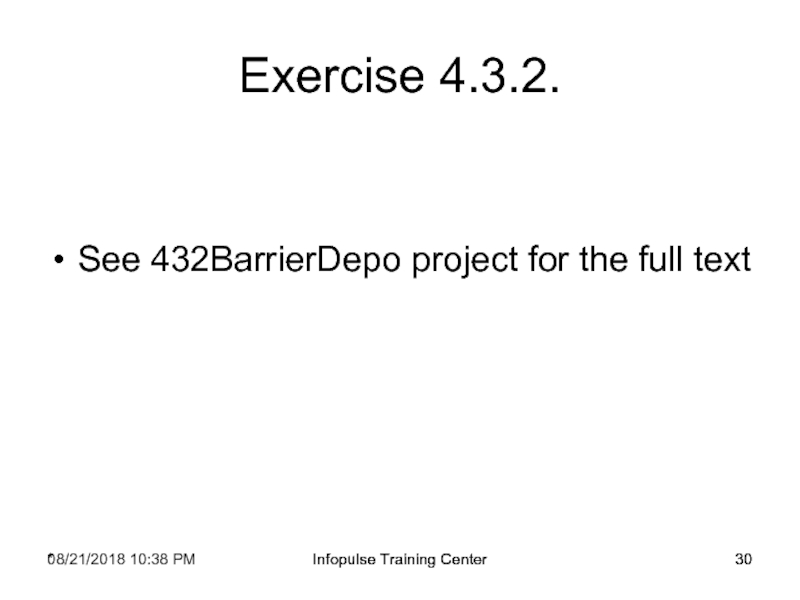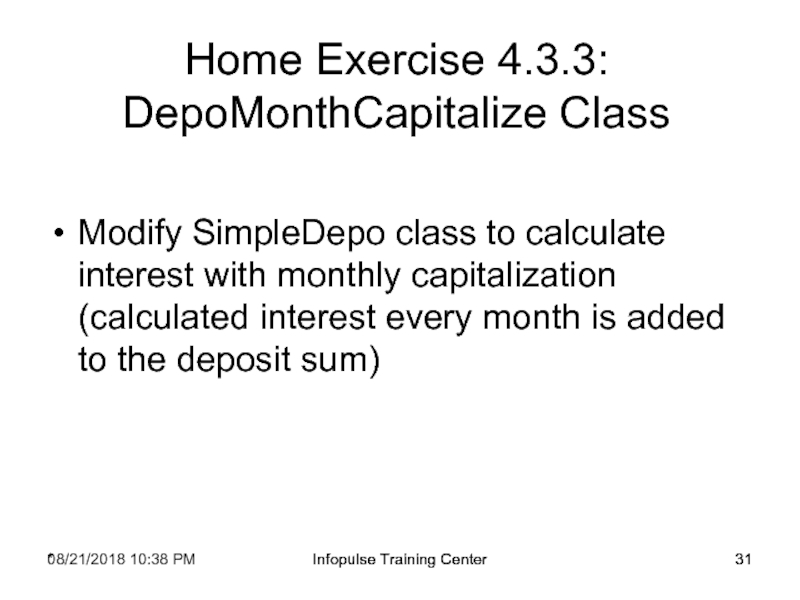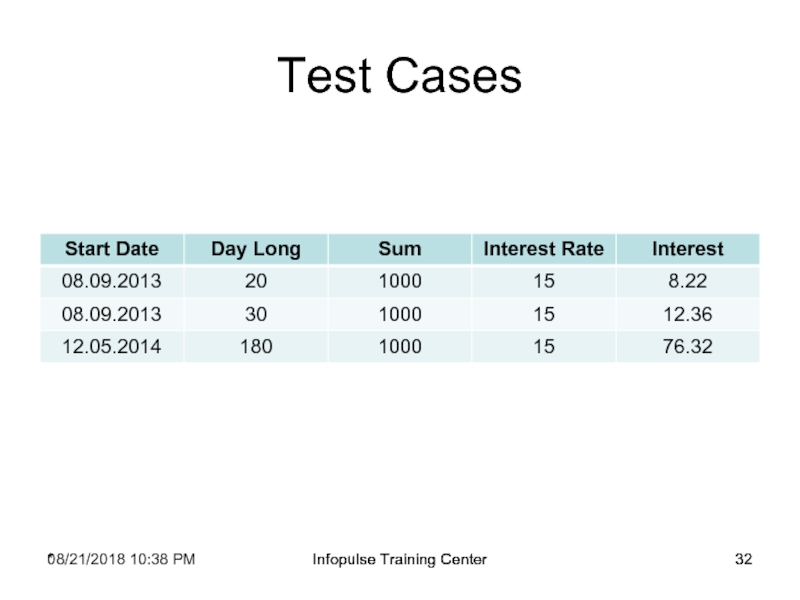- Главная
- Разное
- Дизайн
- Бизнес и предпринимательство
- Аналитика
- Образование
- Развлечения
- Красота и здоровье
- Финансы
- Государство
- Путешествия
- Спорт
- Недвижимость
- Армия
- Графика
- Культурология
- Еда и кулинария
- Лингвистика
- Английский язык
- Астрономия
- Алгебра
- Биология
- География
- Детские презентации
- Информатика
- История
- Литература
- Маркетинг
- Математика
- Медицина
- Менеджмент
- Музыка
- МХК
- Немецкий язык
- ОБЖ
- Обществознание
- Окружающий мир
- Педагогика
- Русский язык
- Технология
- Физика
- Философия
- Химия
- Шаблоны, картинки для презентаций
- Экология
- Экономика
- Юриспруденция
4. Java OOP. 3. Encapsulation презентация
Содержание
- 1. 4. Java OOP. 3. Encapsulation
- 2. 08/21/2018 10:38 PM Infopulse Training Center Class
- 3. 08/21/2018 10:38 PM Infopulse Training Center Methods
- 4. 08/21/2018 10:38 PM Infopulse Training Center Fields
- 5. 08/21/2018 10:38 PM Infopulse Training Center Static
- 6. 08/21/2018 10:38 PM Infopulse Training Center Static
- 7. 08/21/2018 10:38 PM Infopulse Training Center Static
- 8. 08/21/2018 10:38 PM Infopulse Training Center Static
- 9. 08/21/2018 10:38 PM Infopulse Training Center Static
- 10. 08/21/2018 10:38 PM Infopulse Training Center Static
- 11. 08/21/2018 10:38 PM Infopulse Training Center Constants
- 12. 08/21/2018 10:38 PM Infopulse Training Center Constants
- 13. 08/21/2018 10:38 PM Infopulse Training Center Private
- 14. 08/21/2018 10:38 PM Infopulse Training Center Initializing
- 15. 08/21/2018 10:38 PM Infopulse Training Center Static
- 16. 08/21/2018 10:38 PM Infopulse Training Center Manuals http://docs.oracle.com/javase/tutorial/java/javaOO/index.html * Infopulse Training Center
- 17. 08/21/2018 10:38 PM Infopulse Training Center Exercise
- 18. 08/21/2018 10:38 PM Infopulse Training Center Step
- 19. 08/21/2018 10:38 PM Infopulse Training Center Test Cases * Infopulse Training Center
- 20. 08/21/2018 10:38 PM Infopulse Training Center Exercise:
- 21. 08/21/2018 10:38 PM Infopulse Training Center JUnit
- 22. 08/21/2018 10:38 PM Infopulse Training Center Create
- 23. 08/21/2018 10:38 PM Infopulse Training Center Create
- 24. 08/21/2018 10:38 PM Infopulse Training Center Create
- 25. 08/21/2018 10:38 PM Infopulse Training Center Run
- 26. 08/21/2018 10:38 PM Infopulse Training Center Run
- 27. 08/21/2018 10:38 PM Infopulse Training Center JUnit Manual http://junit.sourceforge.net/doc/cookbook/cookbook.htm * Infopulse Training Center
- 28. 08/21/2018 10:38 PM Infopulse Training Center Exercise
- 29. 08/21/2018 10:38 PM Infopulse Training Center Test Cases * Infopulse Training Center
- 30. 08/21/2018 10:38 PM Infopulse Training Center Exercise
- 31. 08/21/2018 10:38 PM Infopulse Training Center Home
- 32. 08/21/2018 10:38 PM Infopulse Training Center Test Cases * Infopulse Training Center
Слайд 208/21/2018 10:38 PM
Infopulse Training Center
Class Access Modifiers
If a class has no
Modifier public means that class is visible to all classes everywhere
*
Infopulse Training Center
Слайд 308/21/2018 10:38 PM
Infopulse Training Center
Methods Access Modifiers
public - visible to all
no modifier (package-private) - visible only within its own package
protected - accessed within its own package and by a subclass of its class in another package
private - can only be accessed in its own class
*
Infopulse Training Center
Слайд 408/21/2018 10:38 PM
Infopulse Training Center
Fields Access
Avoid public fields except for constants
Public
Use special methods to get and/or set class field value
*
Infopulse Training Center
Слайд 508/21/2018 10:38 PM
Infopulse Training Center
Static Fields and Methods
static keyword is used
static fields and methods are referenced by the class name itself
*
Infopulse Training Center
Слайд 608/21/2018 10:38 PM
Infopulse Training Center
Static Fields
every instance of the class shares
any object can change the value of a static field
static field can be manipulated without creating an instance of the class
static field can be used to determine a number of created objects for example
*
Infopulse Training Center
Слайд 708/21/2018 10:38 PM
Infopulse Training Center
Static Field Example
public class Employee{
private int id;
private
public Employee(){
id = nextId;
nextId++;
}
. . . . . .
}
*
Infopulse Training Center
Слайд 808/21/2018 10:38 PM
Infopulse Training Center
Static Methods
Instance methods can access instance and
Class methods can access class variables and class methods directly.
Class methods cannot access instance variables or instance methods directly—they must use an object reference.
Also, class methods cannot use the this keyword as there is no instance for this to refer to.
*
Infopulse Training Center
Слайд 908/21/2018 10:38 PM
Infopulse Training Center
Static Method Examples
You can add to the
public static int getNextId(){
return nextId;
}
Methods of Math class are static:
Math.sqrt(x)
Math.round(y)
*
Infopulse Training Center
Слайд 1008/21/2018 10:38 PM
Infopulse Training Center
Static Methods Invocation
Use the following construction for
ClassName.method(paremeterList);
Examples:
int n = Employee.getNextId();
double x = 2.0;
double y = Math.sqrt(x);
*
Infopulse Training Center
Слайд 1108/21/2018 10:38 PM
Infopulse Training Center
Constants
The static modifier, in combination with the
Constants defined in this way cannot be reassigned
The names of constant values are spelled in uppercase letters
*
Infopulse Training Center
Слайд 1208/21/2018 10:38 PM
Infopulse Training Center
Constants Example
Static variables are quite rare
Static constants
The Math class defines a static constant:
public class Math {
. . .
public static final double PI = 3.14159265358979323846;
. . .
}
You can access this constant as Math.PI
*
Infopulse Training Center
Слайд 1308/21/2018 10:38 PM
Infopulse Training Center
Private Constructor
Private constructors prevent a class from
Private constructor can be useful if:
classes containing only static utility methods
classes containing only constants
type safe enumerations
*
Infopulse Training Center
Слайд 1408/21/2018 10:38 PM
Infopulse Training Center
Initializing Fields
You can often provide an initial
If initialization requires some logic, simple assignment is inadequate
Instance variables can be initialized in constructors
How to provide the same capability for static fields?
*
Infopulse Training Center
Слайд 1508/21/2018 10:38 PM
Infopulse Training Center
Static Initialization Blocks
A static initialization block is
static {
// whatever code is needed for initialization goes here
}
A class can have any number of static initialization blocks
They can appear anywhere in the class body
*
Infopulse Training Center
Слайд 1608/21/2018 10:38 PM
Infopulse Training Center
Manuals
http://docs.oracle.com/javase/tutorial/java/javaOO/index.html
*
Infopulse Training Center
Слайд 1708/21/2018 10:38 PM
Infopulse Training Center
Exercise 4.3.1: SimpleDepo Class
Create a class for
interest = sum * (interestRate / 100.0) * (days / 365 or 366)
*
Infopulse Training Center
Слайд 1808/21/2018 10:38 PM
Infopulse Training Center
Step by Step Solution
Check problem definition. If
Create class
Describe class fields
Create constructors and accessors
Create method signatures
Create unit tests
Create method bodies
*
Infopulse Training Center
Слайд 2008/21/2018 10:38 PM
Infopulse Training Center
Exercise: SimpleDepo Class
See 431DepoSimple project for full
*
Infopulse Training Center
Слайд 2108/21/2018 10:38 PM
Infopulse Training Center
JUnit Testing
JUnit is a simple framework
We’ll create unit tests for SimpleDepo class using Junit with the following steps:
Create new 431aSimpleDepoTest project
Copy DepoSimple class to this project
Create JUnit test case
Create test methods
Run tests
*
Infopulse Training Center
Слайд 2208/21/2018 10:38 PM
Infopulse Training Center
Create JUnit Test Case
Open the New wizard
Select New Junit 4 test and enter "TestAll" as the name of your test class
Click Finish to create the test class
Click Ok in a warning message window asking you to add the junit library to the build path
*
Infopulse Training Center
Слайд 2308/21/2018 10:38 PM
Infopulse Training Center
Create Test Methods (1 of 2)
@Test
public void
DepoSimple depo = new DepoSimple();
depo.setStartDate(new GregorianCalendar(2012, Calendar.SEPTEMBER, 8).getTime());
depo.setDayLong(20);
depo.setSum(1000.00);
depo.setInterestRate(15.0);
double interest = 0.0;
*
Infopulse Training Center
Слайд 2408/21/2018 10:38 PM
Infopulse Training Center
Create Test Methods (2 of 2)
try{
interest =
}
catch(Exception ex){
fail("Error: " + ex.getMessage());
}
assertEquals(8.20, interest, 0.005);
}
*
Infopulse Training Center
Слайд 2508/21/2018 10:38 PM
Infopulse Training Center
Run Tests I
To run TestAll hit the
You can inspect the test results in the JUnit view
You can rerun a test by clicking the Rerun button in the view's tool bar
*
Infopulse Training Center
Слайд 2608/21/2018 10:38 PM
Infopulse Training Center
Run Tests II
Run all tests inside a
Run a single test method: Select a test method in the Outline or Package Explorer and choose Run as > JUnit Test
*
Infopulse Training Center
Слайд 2708/21/2018 10:38 PM
Infopulse Training Center
JUnit Manual
http://junit.sourceforge.net/doc/cookbook/cookbook.htm
*
Infopulse Training Center
Слайд 2808/21/2018 10:38 PM
Infopulse Training Center
Exercise 4.3.2.
Create BarrierDepo class to calculate interest
If sum <= 50000.0 then
interest = sum * (interestRate / 100.0) * (days / 365 or 366)
If 50000.0 < sum < 100000.0 interestRate is increased by 1%
If sum > 100000.0 interestRate is increased by 2%
Use JUnit for tests
*
Infopulse Training Center
Слайд 3008/21/2018 10:38 PM
Infopulse Training Center
Exercise 4.3.2.
See 432BarrierDepo project for the full
*
Infopulse Training Center
Слайд 3108/21/2018 10:38 PM
Infopulse Training Center
Home Exercise 4.3.3: DepoMonthCapitalize Class
Modify SimpleDepo class
*
Infopulse Training Center
